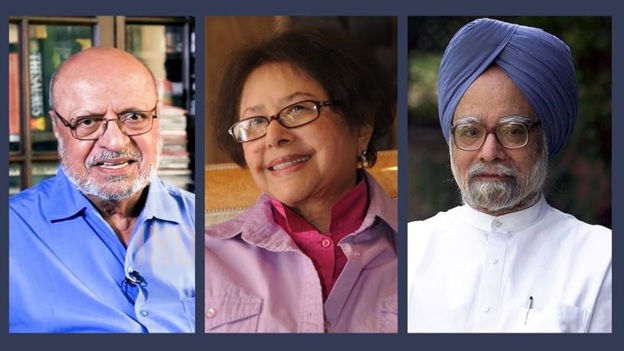
Indian filmmaker Shyam Benegal, Pakistani novelist Bapsi Sidhwa, and former Indian Prime Minister Dr Manmohan Singh - Collage by Regina Johnson
Some Lives That Shaped South Asia
By Sapan News
The loss of three South Asian luminaries in December 2024 – Bapsi Sidhwa, Shyam Benegal, and Dr Manmohan Singh — marks the end of an era. Although they approached their lives and work in different ways, their contributions were deeply shaped by the challenges of navigating postcolonial South Asia, a region marked by the scars of Partition, cultural transformation, and economic change.
Renowned author Bapsi Sidhwa, who passed away at the age of 86 in Houston, was a pioneering figure in South Asian English-language literature. Born in Karachi to Parsi (Zoroastrian) parents with a lineage tracing back over 1,000 years to Gujarat, her early life was marked by trauma. She contracted polio as a child and was subsequently homeschooled, which nurtured her introspective nature and passion for reading.
Sidhwa also bore witness to the horrors of Partition, vividly recalling in interviews the moment she discovered a body and saw fires engulfing her surroundings. At 19, she married and moved to Mumbai, but the marriage ended in divorce, forcing her to return to Lahore and endure the pain of being separated from her sons due to border restrictions ( Stanford University Libraries, 1947 Partition Archive ).
Her acclaimed novel The Ice Candy Man (Cracking India in the US) explores Partition through the eyes of a young Parsi girl, Lenny, examining how communities, relationships, and identities “crack.” The book stands out for its refusal to take sides, instead narrating the trauma of violence and displacement.
In The Crow Eaters, Sidhwa uses humor and satire to chronicle the lives of the Parsi community in colonial India, combating the historical erasure of this vital group. Similarly, An American Brat became foundational in diaspora literature, probing the complexities of immigrant identities and critiquing Western perspectives on South Asians.
“Her portrayal of Parsi characters… makes her a social historian as well as a storyteller,” comments journalist Raza Rumi, a South Asia founder member and Sapan News advisory council member , in his article Locating India, Pakistan , in The Tribune India.
Shyam Benegal, who passed on at the age of 89 in Mumbai is credited with reshaping Indian filmmaking to reflect the realities of a rapidly changing postcolonial nation. He avoided the escapism typical of Bollywood, instead presenting India as it was and is. As a leader of the ‘New Indian Cinema’ or ‘parallel cinema ’ movement in the 1970s, his films embodied realism through minimalism.
Benegal once remarked, “The kind of films I make do not necessarily warrant a bigger budget.”
His works, characterized by long shots and wide angles, invited viewers to engage deeply with the characters’ environments. Films like Nishant and Manthan critiqued systemic oppression and empowered marginalized voices, reflecting the socio-political struggles of a postcolonial India. His Muslim-women-centered trilogy — Mammo, Sardari Begum, and Zubeidaa — challenged stereotypes, offering nuanced portrayals of identity and culture.
India’s former finance minister and prime minister Dr Manmohan Singh navigated the complex realities of post-Partition South Asia. Born in Gah, now in Pakistan, Singh carried the scars of Partition. Traumatized by his grandfather’s brutal murder during the riots, he never returned to Gah.
But he always remained in contact with his friends back, and a close childhood friend from Gah managed to visit him in New Delhi in 2008. Raja Mohammad Ali, who like other friends affectionately called him “Mohna,” even brought soil and water from the village to Singh, along with other gifts.
Though his economic reforms transformed India into a regional leader, his tenure faced criticism for perceived stagnation.
“A violent birth, a bohemian youth of socialist politics and artistic experimentation, and an economic coming of age that embraced the world” defined the arc of postcolonial South Asia, as writer Saikat Majumdar reflects in The Wire India.
These figures, in their own ways, encapsulated this journey, leaving indelible marks on the cultural, artistic, and political identity of the region.
– Sher Ali Khan

